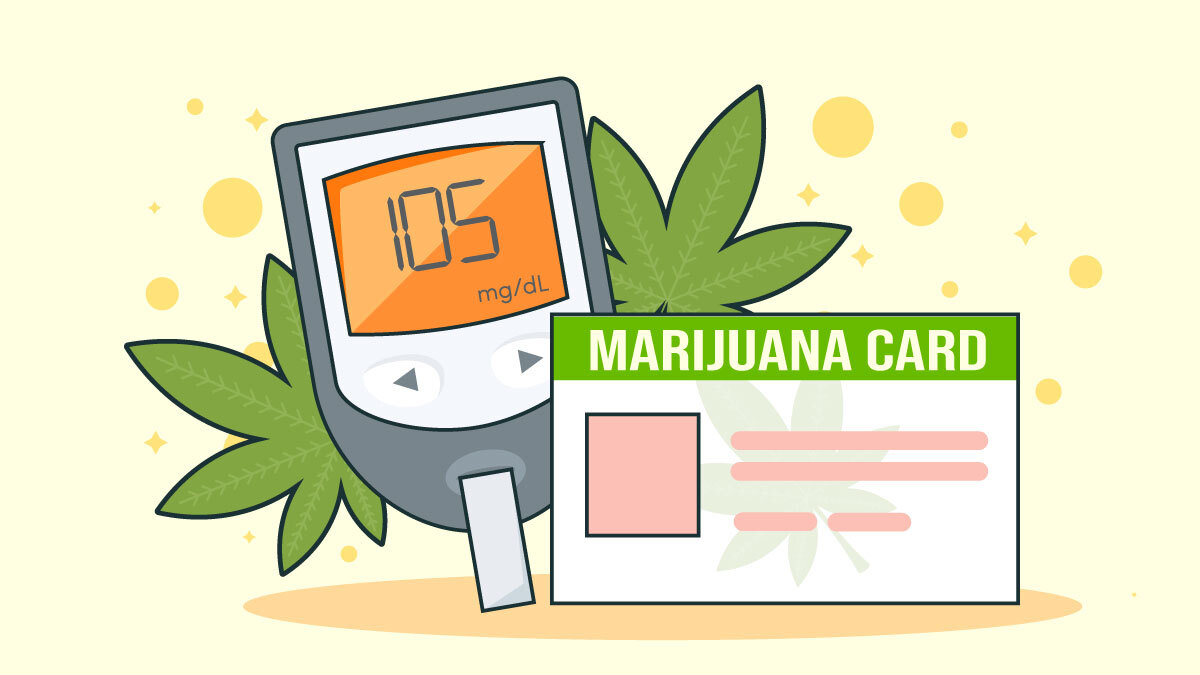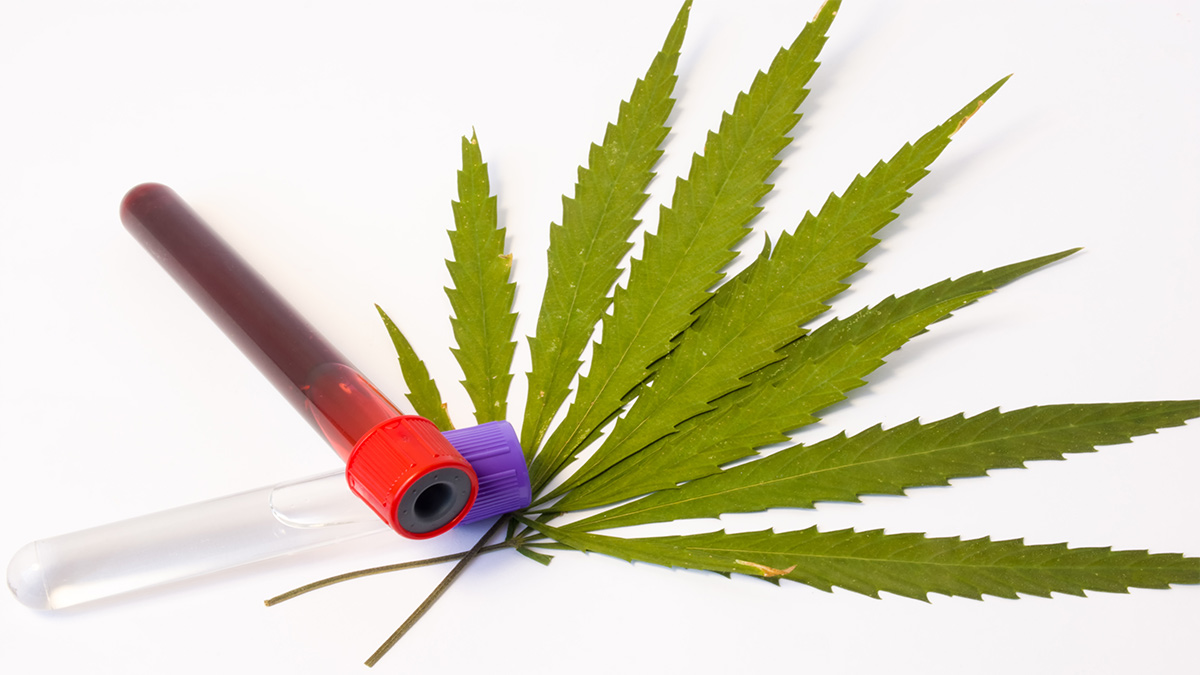Can You Get A Medical Marijuana Card if You Have Diabetes?

Every state with a medical cannabis program determines its own criteria for who’s eligible to participate. They each publish a list of medical conditions and illnesses that determine whether patients can buy marijuana products at local dispensaries.
And here’s the bad news: none of the 39 states (plus Washington, D.C.) with medical marijuana programs list diabetes as a qualifying condition.
Now for the good news: there may be ways to get around that problem. Let’s look a little deeper.
Weed And Diabetics
Relevant research is still relatively new, and much of it has been done with animal subjects, not humans. Even so, the apparent benefits of marijuana appear extremely promising for the millions of diabetes patients in America.
In order to understand those potential benefits, it’s important to briefly look at the causes of diabetes and its possible effects on the body.
What Is Diabetes?
Diabetes is a condition triggered by problems with the body’s metabolism.
The liver uses carbs to produce glucose (blood sugar), in order to supply energy to the body and the brain. And glucose levels are controlled by a hormone called insulin, produced by the pancreas.
When the body doesn’t make enough insulin, or when it isn’t able to handle insulin properly, that causes glucose levels to rise to potentially dangerous levels. That condition is called diabetes, and over time it can lead to cardiac disease, strokes, nerve damage (generally called neuropathy, and known as retinopathy when it affects the eyes), and even kidney disease.
There are two types of diabetes.
- “Type 1 diabetes” occurs when the pancreas produces little or no insulin, it’s relatively rare, and is believed to be genetic. It must be treated with insulin injections.
- “Type 2 diabetes” is the condition that most patients develop over time, and it occurs when the body becomes “insulin resistant” or no longer produces enough insulin. It’s usually a byproduct of lifestyle factors like obesity; less-serious cases are treated with diet and exercise, and more-serious cases require insulin injections.
There are growing indications, though, that cannabis can help effectively treat diabetes.
How Weed May Help Diabetics

As we’ve mentioned, much of the research on how marijuana could help patients with diabetes comes from preliminary animal studies. However, there’s been some published research conducted with human patients that’s even more convincing.
- One study published in the American Journal of Medicine documented lower diabetes risk factors, like lower body mass index and smaller waist circumference, among weed users. It also found that their bodies performed better at turning carbs into glucose, and processed insulin more effectively.
- Another study published in the journal Diabetes Care found that pot-smoking type 2 diabetics (who were not taking supplemental insulin) had less insulin resistance than those who did not use cannabis. Overall, the weed users had healthier blood sugar levels and their bodies produced more insulin.
- Several studies have shown that chronic diabetic neuropathy pain improves with the internal or external use of marijuana or CBD, another cannabinoid found in weed.
And the American Alliance for Medical Cannabis has summarized studies showing even more benefits, including marijuana’s ability to open blood vessels to improve circulation, its anti-inflammatory and neuroprotective properties that ease inflammation and nerve pain, and its ability to lower blood pressure (another diabetes risk factor).
So it’s pretty clear that weed could be a good choice for diabetics. But how do they get it?
Medical Marijuana Programs And Diabetes
If you live in (or near) a “legal” state, you won’t have much difficulty obtaining cannabis. It’s readily available at licensed dispensaries.
The issue is thornier if you’re in a state that hasn’t legalized weed for recreational use. Unless you can find a dealer, your only real option is to qualify for your state’s medical program – that is, if you live in one of the more than three dozen states that issue medical marijuana cards.
Even that isn’t as easy as it sounds.
To get a patient card, you have to be examined by a licensed “marijuana physician” (different states have different names for them). And they are bound by their state’s list of conditions that qualify a patient for legal cannabis use.
Some states have long lists of acceptable conditions. For example, Illinois lists 36 different health issues that qualify a patient for a medical marijuana card; New Hampshire lists 27. On the other hand, some states only allow cannabis use by certain types of epilepsy patients.
Sadly, no states list diabetes as a qualifying condition.
You might think that’s the end of the story. But there’s a very big loophole that patients in many states may be able to use.
Diabetes And Co-Existing Conditions
Most “weed doctors” have one thing in common, other than their physician’s license: they want to help their patients. That means that the majority will go out of their way to help their patients qualify for a medical marijuana card if they think there’s a real benefit.
Here’s why that’s important. Just because you have diabetes, that doesn’t mean you don’t have other medical issues that might make you eligible for a card. In reality, it’s quite common that the side effects of diabetes would qualify you for a medical marijuana program, even though diabetes isn’t on your state’s list.
More specifically, neuropathy is a very painful chronic condition – and research indicates that about half of all diabetics suffer from some degree of diabetic neuropathy. Most states with a medical program list chronic pain as a qualifying condition for a patient card, and most weed doctors will be more than willing to give you the green light to obtain cannabis to treat it.
Diabetic retinopathy isn’t a qualifier in any state but vision issues often are, and some doctors will be more than willing to blur the lines for you.
In fact, the physicians who give approval for medical marijuana cards will usually take a detailed medical history from you, designed to figure out if you have other medical conditions that will allow you to buy weed at a dispensary.
Bottom line: most of the people who determine whether you qualify for medical marijuana look for reasons to say “yes,” not “no.” If you’re diabetic, you have nothing to lose by seeing one of these pot doctors. There’s a good chance they’ll find a reason to approve you.
Can You Get A Medical Marijuana Card For Diabetes? FAQ
Q: My doctor says my depression was mostly a result of my diabetes and other medical problems. Can I get a medical card for depression?
A: There’s plenty of evidence that weed can help patients with depression and anxiety, but neither illness is on the “accepted condition” list in any state. Speak with a marijuana doctor and see if they can figure out a solution.
Q: Are specific strains best for diabetes?
A: Most experts recommend strains high in CBD, like Harlequin or Cannatonic, or ones high in the cannabinoid THCV, like Doug’s Varin.
Q: Can smoking weed help me get off insulin?
A: Probably not, if your disease has progressed to that stage. Your doctor would be better able to answer this question, though.